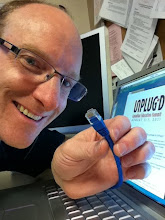 As I've been thinking about how accessible video conference technology has become, I've come to realize that there are many technical considerations that cannot be taken for granted when communicating with long distance guests.
As I've been thinking about how accessible video conference technology has become, I've come to realize that there are many technical considerations that cannot be taken for granted when communicating with long distance guests.1] a computer: Probably the easiest component to procure; both teacher and guest will need a reliable workstation.
2] a data projector: Although the day is not far off for every classroom to have access to projection technology, a teacher might need to scavenge a SmartBoard or projector from somewhere in the school.
3] a robust Internet connection: For a reliable communication channel, a high speed connection with reasonable bandwidth will be necessary to maintain the audio and video signal.
4] video conference software or a suitable online account:
 There are many possibilities, but teachers will need permission to install or access a suitable conference tool. In my own limited experience, I've used Skype, Google Video Chat, Adobe Connect, Adobe ConnectNow, USTREAM.tv, and Elluminate. Other tools are available, and still others are sure to come available.
There are many possibilities, but teachers will need permission to install or access a suitable conference tool. In my own limited experience, I've used Skype, Google Video Chat, Adobe Connect, Adobe ConnectNow, USTREAM.tv, and Elluminate. Other tools are available, and still others are sure to come available.5] camera & microphone: Although many computers now come equipped with an embedded camera and microphone, other USB devices can also be used. Peripheral multimedia tools will require setup, but most operating systems will walk users through the process.
6] a purpose or topic: Regardless what you're teaching, having an engaging purpose for your video conference will ensure the fruitfulness of the event. The conference/meeting/presentation might be a kick-off to a rich learning experience, or it might serve as the culminating activity to a unit of study. Whatever the event, ensure that students have opportunities to interact with the guest.
7] a guest: Although many will rely on their personal learning networks in order to connect with suitable guests, I'm hopeful that teachers will soon be able to recruit speakers from online directories. Resources like MERLOT Virtual Speakers Bureau, VROC, and WiZiQ highlight the potential, but there is still a need for a K-12 directory of long distance guest speakers. Maybe Dave Eggers TED Prize wish will spark the creation of such a directory?
Although many of us may take the idea for granted, hosting a remote guest for a classroom speaking engagement will require familiarity with many ICT tools and processes. Knowing that comfort with the use of A-V through the World Wide Web comes with practice, maybe you should try engaging in video chat with a member of your PLN?
Photo Credit: Jessica Mullen




7 comments:
I am going to say that conferencing is an amazing thing to see and experience. It is crazy to think how technology has improved in twenty years.
thanks for the image credit - that was my first video conference ever, and it was a great experience. it really does come closer to replicating real life interaction - but limits of technology/bandwidth still prevail.
I'm glad you captured the moment Jessica. Thanks too for engaging Creative Commons licensing, that's something I'm always looking to promote with other educators.
All the best,
Rodd
The best conferencing for business and education that I know of, is found at http://try.nefsis.com It is an excellent product that is taking the industry to better places. Far superior to anything else as far as I am concerned.
I used to use the now defunct iSightEd as a place to connect with experts in the field and have been looking for a valuable replacement for K-12 education ever since. We are very willing to partner with other groups in recruiting if someone is (or is interested in) building a database.
Evan,
I've been in contact with a few existing organizations that might be able to fit a database of virtual guests into an existing web strategy.
Is there a link to your 'organization' that you can share?
Rodd-
Absolutely! I work for Heartland Area Education Association (http://www.aea11.k12.ia.us) as the director of online learning and technology consultant. AEAs are state-funded layers of support between the state department of education and the local districts.
We are located in Des Moines, IA.
Post a Comment